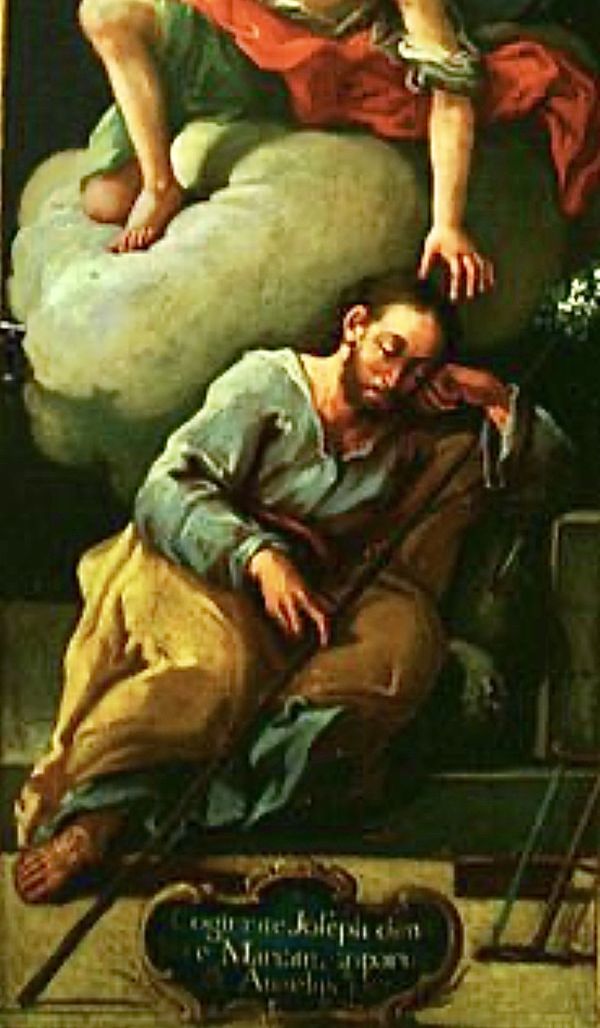(Mt 1:16.18-21.24)
«Even through Joseph’s fears, God’s will, his history and his plan were at work. Joseph, then, teaches us that faith in God includes believing that he can work even through our fears, our frailties and our weaknesses. He also teaches us that amid the tempests of life, we must never be afraid to let the Lord steer our course. At times, we want to be in complete control, yet God always sees the bigger picture» [Patris Corde n.2].
Incarnation: the Father places himself alongside his sons and daughters. Not only He isn’t afraid of becoming impure in contact with things that concern human dynamics: in their Condition even recognizes Himself.
For this reason, the culmination of the entire Salvation Story springs from Joseph's embarrassment.
Sources attest that he was not at all a character with a lily in his hand, but perhaps this may interest us up to a certain point.
The narration of Mt is striking, because the distinction and the possibility of the irruption (of the summit itself) of God's plan on humanity seem to arise not from a certainty, but from a Doubt.
The question mark involves. Discomfort sows a new Germ inside. It tears and cuts down all the alike seedlings of the grass infesting the full Life - which was the chiseled Law on appearances.
The "problem" leads to dreaming of other horizons to open, and in the first person. Hesitation leads out of the mental cages that mortify relationships, previously reduced to casuistry.
The perplexity makes common opinion overlook, because conformity attenuates and extinguishes the Novelty of God.
Hesitation seeks existential fissures: it wants to introduce us into territories of life - where others can also draw on different experiences, varied perceptions, and moments in which to have decisive insights as a gift.
Its wise Energy finds gaps and small passages; it acts to make us evolve as children of Eternity - also arousing inconvenience, which flood existence of creative suspensions and new passion.
Its lucid Action is introduced through Dreams that shake off the usual projects, or states of mind that put them in the balance; and bottlenecks of marginalized thinking that makes us rediscover the reason we were born, discover our part in the world.
Every swing, every pain, every danger, every move, can become a ‘birth’ towards Originality - without identifications first.
Uniqueness doesn’t make us lose the Source that ‘watches’ in us. Woe to shirk: we would lose our destination.
The Spirit that slips into the crevices of standard mindsets finds an intimate spot that allows us to flourish differently now, able to bring out the essence of who we authentically are, and stop copying clichés.
Then we won't keep asking: Whose fault is it? How should we buffer the situation? Who should we lean on?. But rather: What is the new ‘life’ I have to explore? What is yet to be discovered?.
In fact, the bite of doubts does not make one become believer-garbage, as hypothesized in disciplined, legalistic religions - in puritan philosophies with artificial wisdom - vice versa friends, adopted sons [ie chosen] and heirs.
Thanks to the Relation of Faith, we are no longer lost in the desert - because the many things and the hazards become dialogue of specific weight: we are at Home, respecting our mysterious character and Call.
We begin like Joseph to be present to ourselves. And by changing gaze, we will enjoy the Beauty of the New.
«Saint Joseph reminds us that those who appear hidden or in the shadows can play an incomparable role in the history of salvation. A word of recognition and of gratitude is due to them all» [Patris Corde intr.].
To internalize and live the message:
On what occasion did ‘doubt’ open horizons to astound you? In the beautiful and colorful moments of life, did you start from your certainty?
[St. Joseph, March 19]












